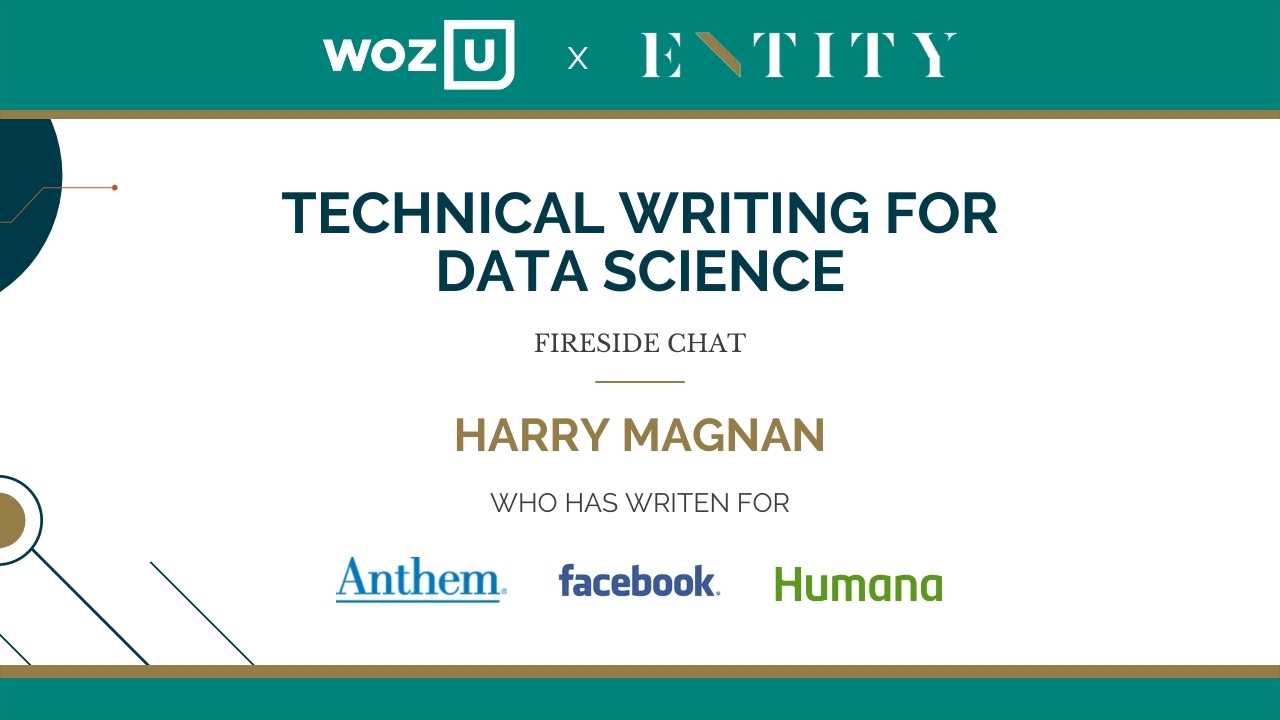Careers vary tremendously in the technology industry.
You don’t need to become an engineer or data scientist if that isn’t your cup of tea. Tech jobs can encompass many skill sets and roles, each playing an important part in creating technology. Journalist Stephanie Stanton moderated “Technical Writing For Data Science,” a Fireside Chat with Harry Magnan. The Fireside Chat, hosted by WOZ U and ENTITY Academy, explores a unique career option in technology — technical writing.
Who is Harry Magnan?
Harry Magnan currently works as a freelance technical writer in Silicon Valley and has written for many companies such as Anthem, Facebook, and Humana.
“I’ve been fortunate enough to play in a lot of different sandboxes,” said Magnan during the Fireside Chat.
Magnan admitted that his career in technical writing began completely by accident.
While moving to Santa Monica and searching for a job locally, he attended a get-together at a technology company. At the event, he spoke with the founder about his writing abilities — before moving to Santa Monica, he worked at a small technical college and had experience with education and writing.
The founder shared that the technology company needed technical writers, and Magnan was offered a job. From that conversation, he began his career in technical writing.
What is Technical Writing?
Are you a detail-oriented left-brained writer looking to break into the tech world? Then, you may want to take a look at technical writing.
Technical writers serve an important role in the technology industry. As Harry Magnan describes during the Fireside Chat, technical writers look at who the user is and explain what they need to know to get the job done.
Even though they might not be working on the engineering or designing procedures of a project, technical writers explain all of the stages of the project with the same nuance and accuracy as an engineer.
Technical writing involves specific hard skills to handle daily responsibilities. For instance, technical writing requires a lot of attention to detail.
A technical writer may be tasked with documenting processes and procedures in an engineering project or studying drawings and mockups. They need to process information and pick out important details to ensure that a manual or paper is properly executed.
Usually, they will interview engineers and ask them pointed questions that clarify the recorded material. Magnan also stated during the Fireside Chat that technical writers have to become experts. They shouldn’t bog down engineers with unnecessary questions. Instead, they should analyze an ecosystem of the material independently.
Role of Technical Writing in Technology and Data Science
Technical writing is expansive and can cover a variety of different industries. They can work at big technology companies like Oracle and Facebook, the healthcare industry, or other STEM-related fields.
Technical writing is also a growing career option in technology. Employment is projected to increase steadily in the next ten years as many companies look to hire more technical writers.
Data Science is one important area in technology that will likely require more technical writers in the future. Artificial intelligence, machine learning, and natural language are still new subfields. As they continue to shape technology in new ways, more technical writers will be needed to document these areas.
Magnan says many companies require technical writers because they need someone who can translate ideas to the end-user.
Skilled writers can execute materials that adhere to a certain style or terminology. They can also help bridge the gap between engineers and users by breaking down challenging concepts and explaining procedures.
Technical writers are also important because they can adapt to different types of writing. They can create a manual for technical documents, a paper for a conference, or a report to verify the security of a procedure.
As technical writer Kate Schneider points out in an article for Northeastern University, technical writers are necessary because they provide help when someone needs it.
How to Become a Technical Writer for Data Science
There are a couple of possible avenues for becoming a technical writer. Someone entering college might want to get a degree in technical writing or a certification. A degree or certificate will cover the basics of technical writing requirements needed for current positions.
Some technical writing will involve coding, and other specializations may not. For instance, technical writers working in data science will want to know topics like Agile, Scrum, Python, and R.
Magnan also recommends joining a technical writing group like Write the Docs. In a technical writing group, people with similar interests can answer technical questions and share insights or resources on their specific industry. A technical group can also offer networking opportunities through conferences or meet-ups.
Advice for Future Technical Writers
Magnan advises future technical writers to find a good mentor, someone who understands the field they want to specialize in.
As with many writing positions, having plenty of samples should be one of the first steps if you’re interested in technical writing.
Once the writing samples are organized and posted on a website, you can share the site with a mentor or another technical writer, and they can provide insight. Then, you can hopefully land a job in technical writing for data science and start your career.

Sophia Acevedo
Sophia Acevedo is a journalist based in Southern California. She is a 2020 graduate from California State University, Fullerton, and a proud Daily Titan alum.




